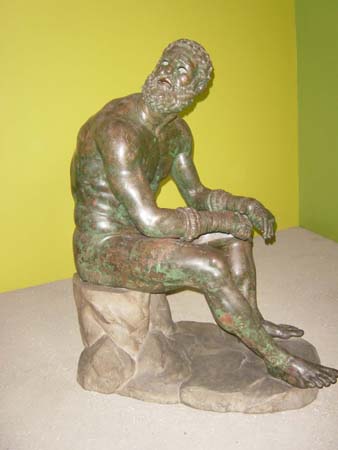DAVID'S DOWNLOADS
September 5 - The Olympics, Old and New
The modern Olympics have been a worldwide tradition since 1896. The Olympics
were originally created by the ancient Greeks around 776 B.C. Greek city-states
were called to gather at the ancient city of Olympia to pay tribute to Zeus.
There they competed in foot races, wrestling, boxing, etc. The modern Olympics
consist of the winter and summer games, which alternate every two years. The
location of the games is also changed each year. Although the modern Olympics
have many differences from the ancient games, they also have many similarities.
The ancient Greek Olympic Games were held in the summer every four years in Olympia. This site was chosen because of the great sanctuary of Zeus, where athletes paid their tributes before competing. The games were open to any honorable man of Greek descent. The first day of the games was devoted to festivity and sacrifices. The second day mainly consisted of foot races in the stadium, an area enclosed by banks of earth where spectators could look on. The next couple of days consisted of wrestling, boxing, and pancratium, a combination of the two. The objective of wrestling was to throw your opponent to the ground three times. Boxing became one of the fiercest sports in the ancient Olympics. At first, gloves were made of soft leather to lighten the blows, but later hard leather sometimes weighted with metal was used. That has got to hurt! Horse racing was also a popular sport. Only the rich could afford to take part in this sport because of the expensive horses (each participant had their own horse). The next event was the pentathlon, a series of five events. These events included wrestling, discus throwing, javelin hurling, long jumping, and sprinting. In the discus event a plate of bronze was thrown. In the javelin hurling event, competitors tried to throw a spear as far as possible. The winners in each event won a reef of olive leaves, fame, and living expenses for the rest of their lives. The ancient Olympics were at their peak in the fifth and fourth century B.C., until the Roman Emperor Theodosius I cancelled them. It was not until the late eighteen hundreds when they were revived and created into the modern Olympics.
The first modern Olympic Games were held in Athens in 1896. Two years before, a French educator named Pierre de Coubertin first introduced the idea to bring back the Olympics in hope of promoting a more peaceful world. The first modern Olympics consisted of only summer games and included 300 athletes from less than 15 countries, competing in 43 events in 9 different sports. It is astonishing to compare that to the 1996 Olympics, which included more than 10,000 athletes from 190 countries, competing in 271 events in 29 different sports! The 2004 summer Olympic Games will be held right in Athens. We saw the construction of the Olympic village and while we were there last week. We heard that they are way behind in construction and working overtime to finish it in time for next year! We also heard that they are 10,000 hotel rooms short, and are bringing in cruise ships for people to stay on.
During the opening ceremonies, many traditions are done to recognize the origin of the games. The torch is lit in Olympia, where the Olympics started, and carried by runners to wherever the games are that year. It sometimes takes months for them to achieve this task, but this year they are lucky. They only have to run a couple days from Olympia to Athens! The torch is lit by magnified sunlight in the ancient stadium. Another tradition is that the Greek team always walks out first during the opening parade of countries. After the parade, doves are released to symbolize world peace.
The Olympics have been an enjoyable tradition for the past 107 years, and hopefully will promote world peace. It has been fun learning and researching about the Olympic Games. It will be cool seeing the Games returning to Greece where they originated in 776 B.C.
